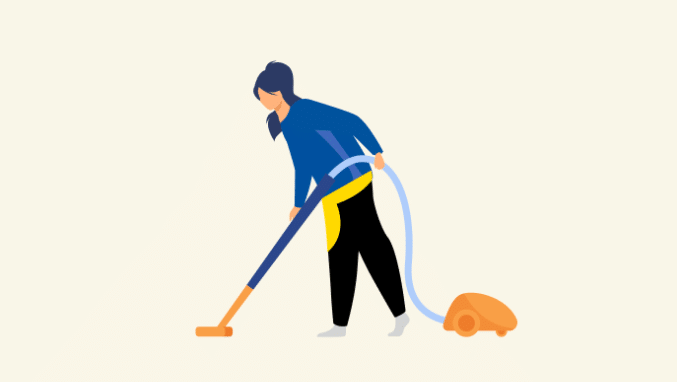Request An Estimate
The coronavirus known as COVID-19, along with germs that cause colds and flu, is becoming more and more of a concern. Experts advise taking extra steps to keep your home free of germs, not only to prevent illness but also to keep it from spreading if someone is already sick.
Research shows that coronavirus is generally transmitted when an infected person produces respiratory droplets that can affect someone nearby, usually within six feet.
For more information about how to protect yourself in public places and at home, the Centers for Disease Control and Prevention (CDC) and other organizations have published guidelines for preventing the spread of the coronavirus.
According to Aubree Gordon, an epidemiologist and associate professor at the University of Michigan’s School of Public Health, the coronavirus can also spread in other ways. “It is also possibly transmitted through indirect transmission, where the virus is deposited on a surface, people touch the surface and then their mouth, nose or eyes.”
COVID-19 is Not Your Every Day Virus
Dr. Laura Greci Cooke, a board-certified internist, uses disinfecting wipes to clean kitchen countertops, drawer pulls, appliance handles, phones and TV remotes. She also disinfects her steering wheel, pens and computer keyboard. Throughout the day, she frequently washes her hands with soap and water and uses plenty of hand sanitizer. She is also careful to cough into her elbow.
Dr. Cooke doesn’t do all this to help prevent the spreading of the coronavirus. She follows this routine to stop a range of viruses, as well as pathogens that transmit disease. “I describe my routine as 80 percent on the extremely clean spectrum. There are probably people who do more than I do. But I hope it’s effective.”
The routine described by Dr. Cooke echoes the preventive measures recommended by the CDC and the World Health Organization. The CDC recommends mixing ¼ cup of household chlorine bleach with one gallon of cool water. They also advise using products that say “disinfectant” on the label and include an EPA registration number. These disinfectants are required to meet government specifications for safety and effectiveness.
Some products, such as bleach and bleach-based cleaners, typically not recommended by The Maids, have shown effectiveness against viruses similar to the coronavirus. White vinegar is an alternative that has also shown effectiveness against viruses similar to COVID-19. The key words here are similar viruses.
Bleach, vinegar and other disinfectants kill coronavirus germs that cause colds and the flu. But there isn’t enough evidence yet to determine if these disinfectants are effective against the COVID-19 strain. According to Brian Sansoni from the American Cleaning Institute, it’s likely the products are still effective, but companies can’t say so directly.
Here’s How to Protect Your Home and Family Against Coronavirus
Washing your hands and disinfecting household items, surfaces and electronics are the best ways to kill viruses like COVID-19 and germs that cause illness. From practicing basic personal hygiene to using disinfectants most effectively, there are plenty of steps you can take to protect your family from getting sick.
Wash your hands
The CDC recommends washing your hands vigorously with soap and water for at least 20 seconds. As an extra precaution, use hand sanitizers that are at least 60 percent alcohol. When you wash and disinfect your hands frequently, it helps prevent COVID-19 from surviving and spreading.
Avoid touching your eyes, nose, and mouth
You and your family’s hands touch many surfaces throughout the day, so picking up germs and viruses is unavoidable. When your hands become contaminated, they can transfer the virus to you through your eyes, nose or mouth. From those entry points, the virus can enter your body and can make you sick.
Clean and disinfect surfaces often
For surface cleaning, you can use bleach as recommended by the CDC, vinegar, commercial disinfectants or a cleaner-disinfectant like Mr. Clean. A cleaner-disinfectant can make cleaning quicker while still killing germs. You can use cleaner-disinfectants for most surfaces in the kitchen, bathroom and all across your home.
Disinfect the right way
Before disinfecting, it’s important to clean up any dirt or grime on the surface to get the most protection from your disinfectant. Follow the guidelines for the disinfectant you choose to eliminate the most germs.
All disinfectants require a certain amount of time on surfaces to be the most effective. Some disinfectants take up to ten minutes to kill common germs and viruses. That means you should keep the surface wet with disinfectant for the duration of the recommended time. To keep surfaces wet long enough, you may have to reapply the disinfectant.
Commonly touched surfaces such as cell phones, door handles, light switches and toilet flush handles should get extra attention. Since it’s uncertain how long the coronavirus can survive on surfaces, disinfecting these areas frequently is recommended.
Home Appliances Can Help Fight COVID-19
Some washing machines have a sanitize or steam settings. Using these settings along with detergent, bleach and peroxide can kill germs. Drying laundry on the dryer’s hot cycle for 45 minutes also is effective against certain viruses and germs.
Dishwashers that feature a sanitize cycle must meet standards set by NSF International, a consumer protection group. Certified dishwashers must reach a final rinse temperature of 150 degrees and achieve a minimum 99.999 percent reduction of bacteria. If you have a sanitizing dishwasher, you can disinfect pet bowls, scrub pads, some kids’ toys and more.
Household air purifiers can help, but shouldn’t replace thorough cleaning and sanitizing. Some purifiers use ultraviolet light, which has been shown to kill germs, but effectiveness can vary by model. While some purifiers and air filters advertise the ability to capture viruses, bacteria and common allergens, they don’t necessarily kill germs and viruses.
A steam cleaner is a good solution for cleaning and disinfecting things you can’t wash in the washer. Steam can kill 99.9 percent of dust mites, germs and bacteria including such dangerous germs as salmonella, staph bacteria and E. coli. Steam cleaners also remove dirt and stains from carpet, upholstery, drapes and other fabrics.
Use a Disinfecting Routine to Combat the Coronavirus
Daily Disinfecting to Prevent Coronavirus
In the kitchen:
- Clean and disinfect countertops, sink hardware, cabinet pulls, appliance handles and cutting boards.
- Use dishcloths you can wash on the hot cycle. Replace towels and dishcloths each day.
- Clean spills so they don’t attract more dirt and bacteria.
- Empty wastebaskets and take out any garbage daily. Spray trash cans with disinfectant each time.
In the bathroom:
- Clean and disinfect the bathroom faucet and handles.
- Empty wastebaskets and disinfect them daily.
- Spray the toilet and flush handle with disinfectant or sanitizing wipes.
- Do not use bath towels or wash clothes more than once to prevent the growth of germs and bacteria.
Weekly Disinfecting to Kill Coronavirus Germs
In the kitchen:
- Wash kitchen sink strainers in the dishwasher.
- Remove and hand wash oven and range knobs.
- Clean and disinfect the kitchen sinks.
In the bathroom:
- Wash your toothbrush holder and toothbrushes and disinfect them. If they are dishwasher safe, just run them through with your dishes.
- Clean and disinfect your bathtub and shower, including the shower doors and handles. If you have a shower curtain that is machine washable, throw it in the washer.
Other rooms:
- Wash bedding in hot water. Limit shaking out your blankets and sheets before washing to minimize the spread of dust and germs.
- Mop hard-surface floors and vacuum carpets.
- Disinfect computer keyboards and mice, light switches, cell phones and remote controls. Be sure to turn off the power on any electronics before cleaning or disinfecting.
If you need help or don’t have the time to follow a disinfecting routine, try one of our affordable cleaning options? The Maids is the only residential cleaning service to specialize in cleaning for health exclusively.
We clean and disinfect and use commercial-grade vacuums with HEPA filtration that can capture up to 99 percent of dust, allergens and other contaminants. You don’t have to fight the coronavirus alone!
Request An Estimate










